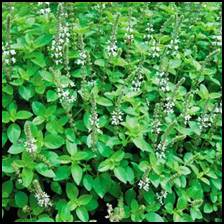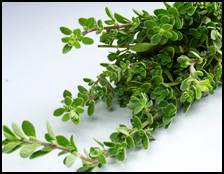You entered Knotted Marjoram, the more common name is...

Marjoram
SCIENTIFIC NAME:(Origanum majorana)
Marjoram is a somewhat cold-sensitive perennial herb or under-shrub with sweet pine and citrus flavors. In some Middle-eastern countries, marjoram is synonymous with oregano, and there the names sweet marjoram and knotted marjoram are used to distinguish it from other plants of the genus Origanum. Marjoram leaf is a bushy plant with small, dark green leaves and flowers that resemble little knots, hence, one of its common names, knotted marjoram, and the plant generally reaches about one foot in height, thriving in well-drained-to-dry, and neutral-to-alkaline soil in full sun.
Common Names:
Garden Marjoram, Knotted Marjoram, Sweet Marjoram.

Uses:
Marjoram leaf is an expectorant that has long been used to loosen and expel phlegm from the lungs. Its Saponin content makes it a fine decongestant that is very useful for bronchial complaints. Great at relieving congestion and mucus in the chest and sinuses, Marjoram leaf also helps to ease Asthma, bronchitis, dry coughs, sinusitis and sinus headaches.As a mild tincture it calms the nervous system, marjoram leaf is thought to be more relaxing than oregano, and it is used to soothe the nerves, reduce tension and mitigate stress, especially environmental stress. The flavonoids possess sedative qualities that help to relieve insomnia, tension headaches and migraines.
Marjoram leaf promotes healthy digestion and treats simple gastrointestinal disorders, such as loss of appetite, indigestion, Nausea and flatulence. it is said to act like Peppermint in the way it soothes minor digestive upsets and Colic.
The flavonoids and Saponins in marjoram leaf are thought to promote healthy arteries and heart. Laboratory experiments claim that it prevents cholesterol buildup, improves blood Circulation and may reduce high blood pressure. These properties may also be helpful in combating Alzheimer’s disease.
Marjoram leaf contains caffeic Acid, a phenylpropanoid, which is an analgesic and anti-inflammatory, and when used internally or externally, the leaf eases pain, confirming its age-old use for alleviating Aches and pains. used externally, it eases toothache pain, rheumatic pain, muscular pain, bruises, Arthritis sprains and stiff joints.
Used internally, marjoram leaf eases severe stomach cramps, spasms and painful Menstruation (and will also stimulate suppressed Menstruation).
As a mild diuretic, marjoram leaf will promote the flow of urine, helping to relieve stomach Bloating and clearing the body of toxins and cleansing the blood. This action is also said to benefit eruptive diseases and skin disorders, particularly Eczema.
Marjoram leaf is also a diaphoretic and stimulates perspiration, which also helps to rid the body of toxins through the skin. This quality assists in reducing fevers and helps to relieve cold and Flu symptoms.
Marjoram leaf is considered a natural disinfectant, antiseptic, antifungal and antibacterial that possesses healing qualities and combats infection. The saponins are said to help heal wounds and prevent scarring.
The flavonoids in marjoram leaf are believed to have an antioxidant effect against the free radicals that can damage important cellular molecules or other parts of the cell.
Marjoram leaf can be infused as an aromatic Tea for Colds, headaches, simple gastrointestinal disorders and tension.
Applications:
Tea:
Marjoram tea can help you overcome depression. To prepare the tea, add six tablespoons of chopped herb per one cup of boiling water, cover for 15 minutes, then strain. Be careful and use it only for short periods (3-4 weeks, with at least 3 weeks breaks), especially if you also consume St. John's Wort tea.
Tincture:
3 to 5 Tablespoons to relieve symptoms and aid in relaxation to help you sleep. Not to exceed 10 Tablespoons per day and not to treat for more than a two week period.
Oil:
Follow directions on bottle.






